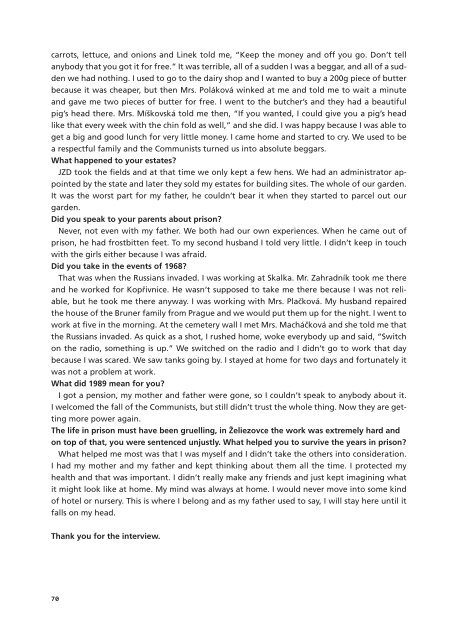Czechoslovak Political Prisoners - über das Projekt Political ...
Czechoslovak Political Prisoners - über das Projekt Political ...
Czechoslovak Political Prisoners - über das Projekt Political ...
You also want an ePaper? Increase the reach of your titles
YUMPU automatically turns print PDFs into web optimized ePapers that Google loves.
carrots, lettuce, and onions and Linek told me, “Keep the money and off you go. Don’t tell<br />
anybody that you got it for free.” It was terrible, all of a sudden I was a beggar, and all of a sudden<br />
we had nothing. I used to go to the dairy shop and I wanted to buy a 200g piece of butter<br />
because it was cheaper, but then Mrs. Poláková winked at me and told me to wait a minute<br />
and gave me two pieces of butter for free. I went to the butcher’s and they had a beautiful<br />
pig’s head there. Mrs. Míškovská told me then, “If you wanted, I could give you a pig’s head<br />
like that every week with the chin fold as well,” and she did. I was happy because I was able to<br />
get a big and good lunch for very little money. I came home and started to cry. We used to be<br />
a respectful family and the Communists turned us into absolute beggars.<br />
What happened to your estates?<br />
JZD took the fields and at that time we only kept a few hens. We had an administrator appointed<br />
by the state and later they sold my estates for building sites. The whole of our garden.<br />
It was the worst part for my father, he couldn’t bear it when they started to parcel out our<br />
garden.<br />
Did you speak to your parents about prison?<br />
Never, not even with my father. We both had our own experiences. When he came out of<br />
prison, he had frostbitten feet. To my second husband I told very little. I didn’t keep in touch<br />
with the girls either because I was afraid.<br />
Did you take in the events of 1968?<br />
That was when the Russians invaded. I was working at Skalka. Mr. Zahradník took me there<br />
and he worked for Kopřivnice. He wasn‘t supposed to take me there because I was not reliable,<br />
but he took me there anyway. I was working with Mrs. Plačková. My husband repaired<br />
the house of the Bruner family from Prague and we would put them up for the night. I went to<br />
work at five in the morning. At the cemetery wall I met Mrs. Macháčková and she told me that<br />
the Russians invaded. As quick as a shot, I rushed home, woke everybody up and said, “Switch<br />
on the radio, something is up.” We switched on the radio and I didn’t go to work that day<br />
because I was scared. We saw tanks going by. I stayed at home for two days and fortunately it<br />
was not a problem at work.<br />
What did 1989 mean for you?<br />
I got a pension, my mother and father were gone, so I couldn’t speak to anybody about it.<br />
I welcomed the fall of the Communists, but still didn’t trust the whole thing. Now they are getting<br />
more power again.<br />
The life in prison must have been gruelling, in Želiezovce the work was extremely hard and<br />
on top of that, you were sentenced unjustly. What helped you to survive the years in prison?<br />
What helped me most was that I was myself and I didn’t take the others into consideration.<br />
I had my mother and my father and kept thinking about them all the time. I protected my<br />
health and that was important. I didn’t really make any friends and just kept imagining what<br />
it might look like at home. My mind was always at home. I would never move into some kind<br />
of hotel or nursery. This is where I belong and as my father used to say, I will stay here until it<br />
falls on my head.<br />
Thank you for the interview.<br />
70


